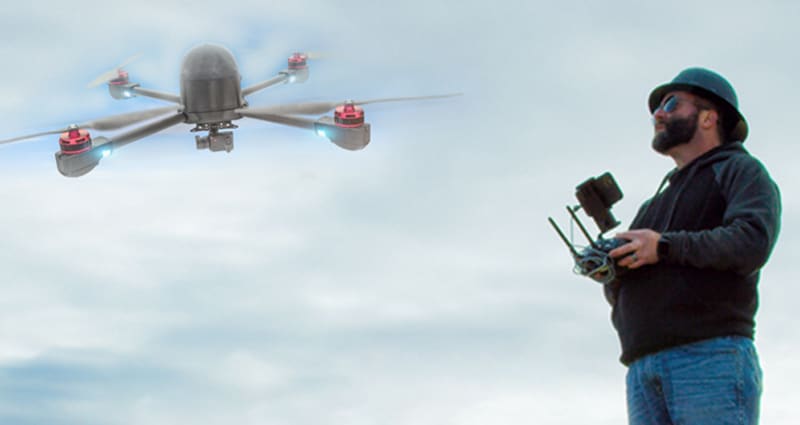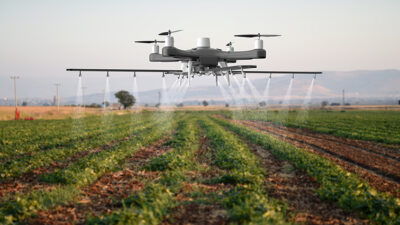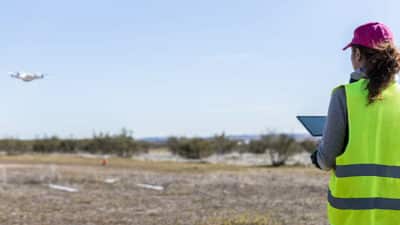Contracting Drone Operators: Pros and Cons for Your Organization

The use of small unmanned aircraft systems (sUAS) among corporate and government entities has risen steadily since 2016, following publication of federal sUAS regulations (Part 107). Many organizations have seen the potential sUAS have to increase efficiency, improve safety and enhance capabilities, and are leveraging these advantages.
Virtually all sUAS adopters can attest that implementing a new type of aviation operation is a huge undertaking. Even organizations that have conducted manned aviation operations for years and maintain an experienced aviation department or division often experience challenges.
One of the most significant hurdles that impacts medium to large organizations that are ready to scale their sUAS operations is the question of where to source their drone pilots. There are two main options. Companies can either use internal employees or contract with third-party companies or organizations. There are pros and cons to each approach. In this article, we’ll discuss specific areas decision makers should focus on when working to determine which route is the best option for their organization.
The Main Argument for Contract Operators
The biggest benefit of looking outside of your internal ranks for drone pilots is the depth of the candidate pool. The FAA has issued over 150,000 Remote Pilot Certificates since August 2016, making it the fastest growing certificate type in FAA history. Many of these operators obtained their Remote Pilot Certification with the intent of starting their own small business, and a significant portion have succeeded. This means that there is a large cadre of self-employed sUAS professionals available for hire. In addition, the demand for large numbers of drone operators has spawned the creation of numerous placement companies that serve as intermediaries, connecting those in need with the service providers that can deliver.
Why Not Contract from Outside?
If a plethora of drone pilots already exists in the current “buyers’ market,” along with small service providers able to conduct diverse operations with below-average overhead, why shouldn’t organizations turn to contractors when looking to scale? The flip side of this coin carries a potentially large pitfall: the lack of standardization in skills that currently exists within the sUAS industry.
Current Part 107 regulations do not require prospective Remote Pilot Certificate seekers to complete a practical exam related to their piloting skills. The only requirement is the satisfactory completion of a computer-delivered knowledge exam demonstrating the certificate holder’s fundamental understanding of the U.S. National Airspace System’s (NAS) management and organization. Passing this test grants remote pilots the ability to operate drones for professional purposes. With a nominal $150–$165 fee to complete the exam and obtain their FAA Remote Pilot Certificate, it’s unsurprising that the number of FAA-certificated sUAS pilots has skyrocketed.
While this is great news in terms of the sheer number of operators available, it has created a number of headaches for organizations in need of drone services.
First, the lack of a practical exam means that an individual’s ability to obtain a Remote Pilot Certificate says nothing of their competency in flying a small unmanned aircraft. They have never completed a formal evaluation of their flight skills. And even if a certificate holder has logged hundreds of hours flying as an enthusiast, they may have absolutely no experience using a drone to collect the type of actionable data your organization demands. This can result in an organization needing to hire multiple candidates to complete a single assignment, quickly increasing project costs.
Is There a Good Solution?
Although the FAA has shown no indication of incorporating a Practical Assessment for Remote Pilot Certification under Part 107, the industry has recognized the potential skills gap and responded in several ways. Worldwide organizations such as the Association of Unmanned Aircraft Systems International (AUVSI) have engaged industry stakeholders in the creation of standards-based systems of evaluation, such as the AUVSI Trusted Operator Program (TOP) and the National Institute of Standards and Technology’s (NIST) Standard Test Methods for Unmanned Aircraft Systems.
As a prospective contractor of sUAS services, it is highly advisable that you vet individual remote pilots by requiring the successful completion of a practical skills evaluation in accordance with a recognized industry standard. It is also important to request examples of the imagery or data sets the potential candidate has collected before finalizing a contract.
Finally, consider partnering with an experienced provider of qualified sUAS pilots. Organizations that pride themselves on being more than just a job board for drone operators are often able to take the guesswork out of the drone pilot contracting experience. These professional organizations are able to ensure skill level, project type experience, insurance minimums, sUAS capabilities and other critical considerations. Establishing relationships with such organizations can take much of the risk out of contracting directly with a small service provider.
About the Author
Colin Romberger is the Chief Pilot at DARTdrones and graduated from Embry Riddle Aeronautical University as one of the first 5 students to earn a Master’s Degree in Unmanned Aircraft Systems, with a focus in Flight Operations and Systems Design. Colin also holds multiple FAA Airman Certificates for manned aircraft operations. At DARTdrones, Colin is responsible for ongoing instructor development initiatives as well as the coordination of sUAS Operations Consultation Services tailored to the specific use cases and operating environments of our corporate clients in numerous sectors such as oil & gas, utilities, engineering and more. He has consulted with these companies and organizations on their use of sUAS for a cross section of purposes. Colin also runs his own drone services company specializing in mapping and inspections.

DARTdrones, the nation’s leading drone training company and Global Aerospace SM4 partner, offers courses in 40+ cities across the U.S. DARTdrones offers basic flight training classes, Part 107 Airman Knowledge test prep courses, advanced industry specific training, and UAS program implementation consulting services. DARTdrones has been helping individuals and organizations develop safe and efficient sUAS programs and continues to keep new and developing safety considerations at the forefront of their curriculum development. For more information, visit us or call the team at 800-264-3907. DARTdrones was featured on ABC’s Shark Tank in February 2017.
http://www.dartdrones.com
© 2024 DARTdrones. All Rights Reserved.
Next ArticleRelated Posts

The Dawn of Drone Agriculture: Navigating the Skies of Modern Farming
In the past decade, the agricultural industry has seen a significant technological revolution, with the advent of drones, also known as Unmanned Aerial Vehicles (UAVs), being one of the most transformative. These high-flying tools have revolutionized the way farmers and agronomists approach crop management, pest control and land analysis.

Beyond Part 107: Enhancing Drone Pilot Skills for Safety and Performance
As a licensed drone pilot, you can fly commercial missions, embark on exciting new adventures, hone your skills and earn money. Your Part 107 license is an important start on your training journey. However, additional training beyond Part 107 is crucial. You should invest in your future and strive to become the best drone pilot you can be!

